"The call of the unborn tomorrow" - basic underpinnings of Futures
Intro to Futures, Week 2
This week focused on the concept of Images of the Future. We started by diving into a seminal work in the field: Image of the Future by Fred Polak. It was written in the 70s in Dutch and translated to English, and it definitely has the style: whenever I have read European philosophy, it gives me a strong vibe of Werner Herzog musing on the jungle1: sweeping, enigmatic pronouncements about the nature of reality intended to be accepted by force of the momentum of the confidence and intellectualism.
Chapter 1 lays out the future as a subset of “the Other”, the part of our world that lies beyond perceptual reality. The Other is a big place: not only does it does it contain the unseen portion of this world (which includes the future as we normally conceive of it), it contains the imagined/imaginable realities before and after this world, above and below this world, outside the world, and beyond all worlds. What’s key is that these various regions of the Other are porous - they influence each other2, but they also influence perceptual reality. Refocusing on imaginings of the future in particular, the lesson is that the future is present with us - the way we think about the future can change the world today. More concretely: to what extent did the depiction of the future in 2001 inertly predict the future, and to what extent did it draw the future toward it? Would so many startups be working on flying cars if it wasn’t such a dominant element of images of the future, from The Jetsons to Back to the Future to The Fifth Element? Our images come from a context, but they also create a context.
Polak specifically calls out the knowledge of death as a key driver that causes people to be curious about the future, and calls out the charting of the future as an act of irresistible hubris - he equates this with the drive for adventure in the human spirit that’s opposed by the drive for safety and familiarity - I’ve heard of this idea in some circles as Eros vs Thanatos energy, but that’s definitely not how the post-Freudians use those terms.
We also read an article by Hayward and Candy3 taking a single paragraph from Polak and instantiating it as an activity (called, naturally, the Polak Game) to start conversations about how people approach thinking about the future. We did this activity in the first week of class, but what occurred to me from the reading and discussion was how sensitive an individual’s self-reported view of the future is to the specifics of how the question is posed. In addition, the article points out several ancillary benefits of the exercise: it creates a shared framework and vocabulary for discussion, and it allows a systematic consideration of how one viewpoint is seen by those holding others.
The strongest image from the lecture was recasting the expectations of a futurist’s work: rather than a fortune-teller, it’s closer to being a parent training a child to brush their teeth daily: it’s creating a culture to habituate a practice because of a reasonable expectation of a future benefit, without a sense that we’re totally protected against all negative outcomes; rather than a clear forecast of what to expect, it’s a sense of what kinds of things we’re working to achieve or avoid (again, to put a point on it, plausible images of the future).
The assignment for the week was to select an image of the future and describe it: who created it, why, and what are the assumptions about what would cause people to move toward that future. I selected the Android Universe, which is a very specific cyberpunk world created by Fantasy Flight Games as a setting for their Netrunner card game4, a tabletop role-playing game, and various other products. This setting is very detailed and well-described5, so the surface assumptions are pretty clear (materials sciences advances required to build a space elevator, a reliable energy source from lunar Helium-3, etc), and the trick is to dig down to the underlying assumptions that would make this a reasonable future to anticipate. What would lead humanity down a path where the consolidation of corporate power continues, and economic inequality dramatically increases? I decided the real core is the willingness of most people to trade distraction and comfort for meaning and justice - “bread and circuses” is overused as shorthand, but it really boils down to the balance and tension between the desire for adventure/expansion vs safety discussed above.
As a simple example from a Christian viewpoint, think about how the interplay of Heaven (above) and Hell (below) shape the creation of a new earth (after) in the book of Revelation.
The Polak Game, or: Where do you stand? The images in that article give a good sense of the basics of the exercise.
I co-hosted a podcast about this game from 2018-2021, Kitchen Table Netrunner. Highlights include staying up until 1am in a little room in Rotterdam editing audio from interviews done that day at the 2019 world championships so I could post a daily digest in near real time.
See, for example, the sourcebook for the setting, The Worlds of Android.



